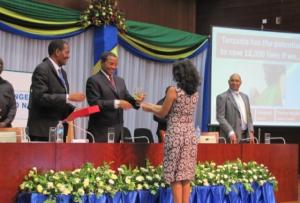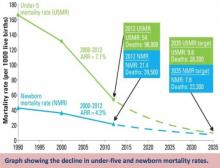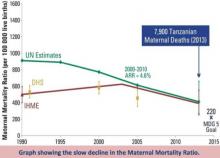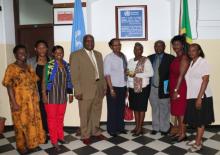The United Nations in Tanzania recognized for improving Maternal, Newborn and Child Health
The United Republic of Tanzania is among the eight countries piloting Delivering as One (DaO) since 2007 as part of the UN Reform. Consequently the UN in Tanzania is mandated to innovate and experiment with ways of planning, implementing and reporting as One for enhanced coherence, effectiveness and efficiency through the UN Development Assistance Plan (UNDAP) 2011-2015. The Health and Nutrition Working Group is among the ten Working Groups of the UNDAP which provides technical engagement and comprehensive capacity building to fill the most pressing gaps at all levels in all sectors, including technical knowledge, planning, coordination, management, financial and budgeting skills. The Participating UN Agencies in the Health and Nutrition Working Group include; The World Health Organization (WHO), the United Nations Population Fund (UNFPA),the United Nations Children’s Funds (UNICEF) and The World food Programme (WFP). WHO is the chair of the Working Group.
The UNDAP 2011-2015 benefits from the pooled funds which are known as One Fund. These funds are distributed to UN Agencies based on the Memorandum of Understanding agreed by the UN agencies. The UNDAP Health and Nutrition Working Group has enjoyed some preferential treatment in the allocation of the One Fund as the Canadian International Development Fund has donated about US$ 40 million for UNDAP 2011-15 specific for the Maternal, Newborn and Child Health.
Tanzania like many countries in the African Region is striving to attain the Millennium Development Goals (MDGs), particularly the health related goals number 4, 5 and 6. With support from the UN Health and Nutrition Working Group, the country has witnessed progress in the areas of Maternal, Newborn and Child Health (MNCH) over the past four years through ensuring health facilities have adequate equipment,supplies and supporting a large number of health care staff to have the necessary competencies along the continuum of care i.e. family planning, antenatal care, emergency obstetric and newborn care (EmONC), postnatal, immunization, management of childhood illnesses and improving the referral system.
Through the UN support, Tanzania has achieved remarkable progress in child survival and has already reached its target for MDG 4. The under-five mortality rate has declined from 112 per 1000 live births to 81 per 1000 live births (Tanzania Demographic and Health Survey-TDHS 2005 & 2010) or to 54 per 1000 live births (UN Levels and Trends in Child Mortality, 2013 Report) demonstrating that Tanzania has achieved the MDG 4 target.
Despite these achievements, Tanzania has observed slow progress in newborn and maternal survival. Newborn mortality constitutes 40% of all under-five children deaths, and has declined from 32 per 1000 live births in 2005 to 26 per 1000 live births in 2010. The maternal mortality ratio has slowly declined from 870 per 100,000 live births (1990) to 454 per 100,000 live births in 2010. There is a high utilization of antenatal care services at 96% for at least one antenatal care visit, however only 50% of all births in Tanzania occur at health facilities. Postnatal care service utilization is still low, at 31% within 2 days after delivery. Despite high knowledge of contraceptives (98%), the modern methods contraceptive prevalence rate is relatively low at 27% and unmet need relatively high at 25% (TDHS 2010).
The major contributors to newborn death are three- prematurity, asphyxia and sepsis; conditions which are closely linked to the health of the mother and the baby during pregnancy, at birth and during the first week of life. The majority of maternal deaths in Tanzania are due to limited access to family planning and poor quality of health services including EmONC. More critical is the shortage of skilled human resources and lack of enabling environment for human resources to function e.g. appropriate infrastructure, essential equipment and medicines and poor referral systems.
With 600 days remaining before the MDG deadline, the President of the United Republic of Tanzania recently during the launch of the RMNCH scorecard and the Sharpened One Plan made a pledge “Today, we renew our promise to ensure the survival of mothers and children in Tanzania”. It was during this event that the Government of the United Republic of Tanzania presented an Award to the United Nations’ Health and Nutrition Working Group for its outstanding contribution and partnership towards improvement of women and children’s health in Tanzania. The award was received by the UNFPA Country Representative, Ms. Mariam Khan, on behalf of the UN Agencies in Tanzania. The UN committed to continue supporting the Government to further address the challenges in the implementation of the Sharpened Plan up to 2015 and in the Post 2015 Agenda.
The four UN Agencies (UNFPA, UNICEF, WFP and WHO) agreed to celebrate the success, by taking turns to host the Award in their Agencies each for a period of one week. The Award will finally be kept at the UN Resident Coordinator’s Office.








